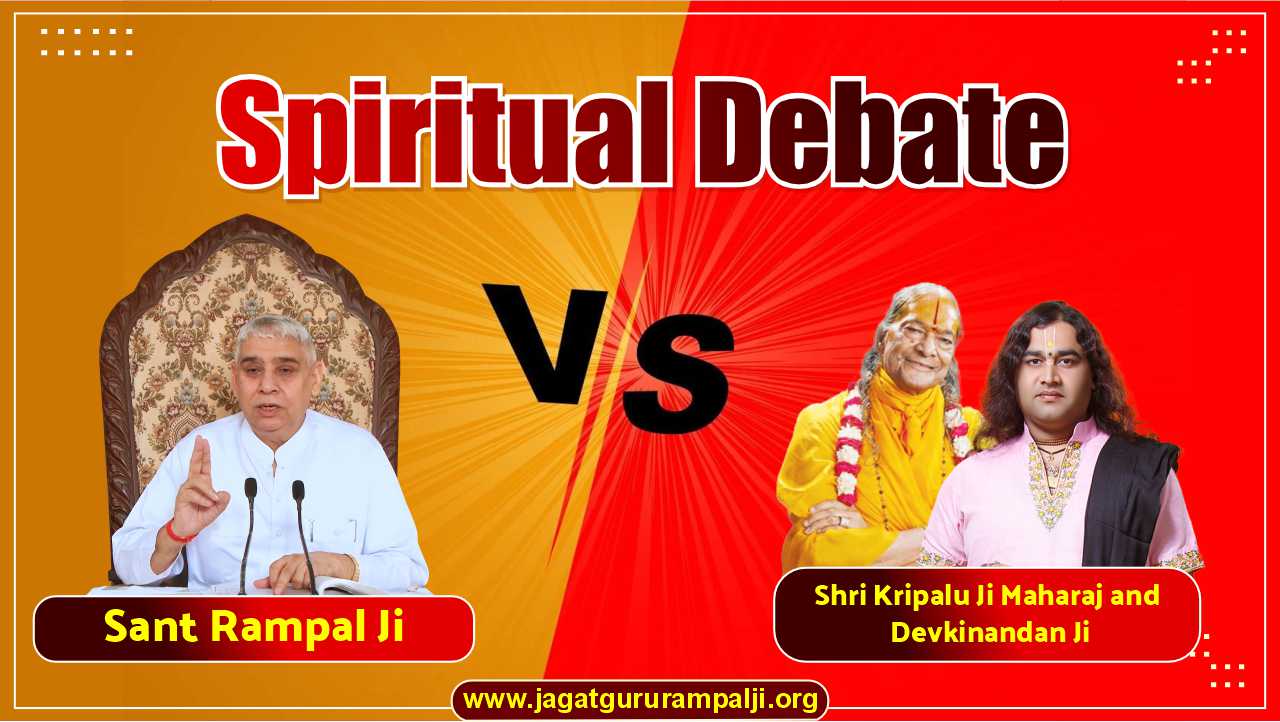
This video reveals the Supreme Power Who is above all, mentioned in our Holy Scriptures. Devotees can attain salvation only by following that true devotion. The Shrimad Bhagwat Gita is a sacred scripture of Hinduism that teaches the purpose of human existence, and the paths to salvation (moksha). It has 700 verses and is part of the Mahabharata. It unveils the Supreme God and asks the seekers to surrender to Him.
Misinterpretation in Translation of Gita Ji Chapter 18 Verse 66
sarva-dharmān parityajya mām ekaṁ śharaṇaṁ vraja
ahaṁ tvāṁ sarva-pāpebhyo mokṣhayiṣhyāmi mā śhuchaḥ
Translation:- “Abandon all varieties of dharmas and simply surrender unto Me alone. I shall liberate you from all sinful reactions; do not fear.”
Some verses of the Gita have been mistranslated, leading to confusion. For example, here, the word "vraj" means "to go", not "to come". The speaker of the Gita tells Arjun to go to the refuge of the Complete God. Different translators have interpreted this differently.
Some Spiritual Saints, like Shri Kripalu Ji Maharaj and Devkinandan Ji, agree with this verse. They think that this verse is a divine call from Shri Krishna Ji, who is the source of everything, to surrender to him. They regard Shri Krishna Ji as the highest and most complete form of God.
Saint Rampal Ji Maharaj explained the meaning of 'Vraj' mentioned in Gita chapter 18 verse 66 through a Sanskrit Hindi dictionary. The Sanskrit Hindi dictionary explains that 'Vraj' means to go, to walk, and to progress. For example, if the meaning of 'Go' is "to go", then its meaning cannot be "to come".
The speaker of the Gita, Brahm, says in verse 63 that he has given the secret knowledge of the Gita to Arjuna. Then in verse 64, he says another secret that the Supreme God in verse 62 is his revered deity. This is also in Chapter 15 verse 4 that he is in the refuge of that Supreme God. This means that there is a God higher than the speaker of the Gita. He is the only one worthy of worship.
The speaker of the Gita says in Chapter 15 verse 17 that the Supreme God above Kshar Purush (Brahm) and Akshar Purush (ParBrahm) is someone else. He is the real Parmatma (God) Who is the true immortal. He tells Arjuna to do His bhakti in Chapter 8 Verses 5, 7, and to do the bhakti of Param Akshar Brahm (Complete God) in Chapter 8 Verses 8, 9, 10. He says that the one who worships him, comes to him. The one who worships Tat Brahm goes to Him. He gives one letter ‘Om’ (ॐ) as a mantra for his worship, and "Om (ॐ) Tat Sat" for the worship of the Tat Brahm.
Hence, this video is essential viewing as it elucidates the concept of the One God and the correct method of worship as outlined in our scriptures. To know more, watch till the end.
The central message of the Shrimad Bhagwat Gita is to surrender to the Supreme God for salvation, as revealed in Chapter 18 Verse 66.
Chapter 18 Verse 66 of the Gita consists of a word “vraj”. The word "vraj" has been mistranslated as "to come" instead of its correct meaning, "to go” which misinterpreted the entire meaning.
Saint Rampal Ji Maharaj is only all-capable true saint to translate the verses of Gita Ji correctly.
'Vraj' means to go, to walk, and to progress, not to come.
Chapter 18 Verse 66 of Gita Ji explains that the speaker of the Gita, Brahm, acknowledges a Supreme God higher than himself and encourages devotion to this Supreme God.
According to Chapter 15 Verse 17 of the Gita, the superior God is the Param Akshar Brahm (Supreme God) who is above both Kshar Purush (Brahm Kaal) and Akshar Purush (ParBrahm).
The worship for the Brahm is indicated by the one-letter mantra "Om" (ॐ) in Chapter 8 Verse 13, while the worship for Tat Brahm (Supreme God) is "Om Tat Sat" told in Chapter 17 Verse 23.
If you have any query regarding the above content then please email us at [email protected], we will try to solve it with proof.
Sachin Kashyap
I've read the Bhagavad Gita and I know that our gurus have accurately interpreted the meaning of "vraj" because there is no Supreme Power greater than Lord Shree Krishna. The meaning of the word "vraj" can change depending on the context, so "come" is the correct interpretation.
Satlok Ashram
Dear reader, we appreciate your engagement with our article. Your perspective may stem from a lack of complete spiritual knowledge regarding the Supreme Power mentioned in our Holy scripture. There are numerous evidences indicating that the Supreme God is not Shri Krishna, but someone above him. Interpreting words based on personal desires can lead to misinterpretation, as seen with many gurus in the past who failed to identify the Supreme God. Sant Rampal Ji Maharaj has provided the correct meaning of all holy scriptures and the proper way of worship, which demonstrates the miracles of God in ways other worship practices cannot. We recommend deeply analyzing the knowledge of Sant Rampal Ji Maharaj through reading "Gyan Ganga" and listening to his spiritual discourses available on all social media platforms to understand the correct knowledge.